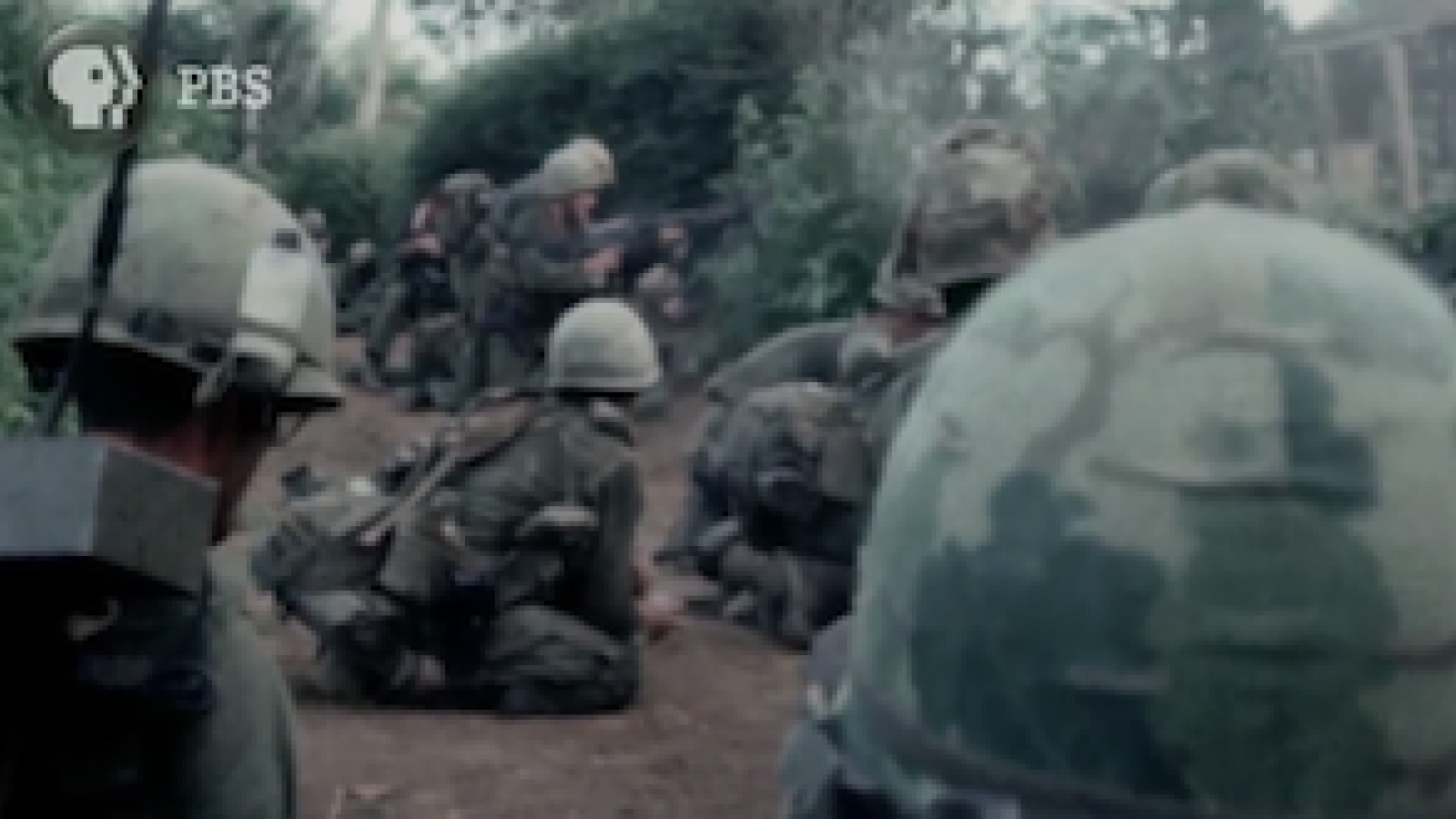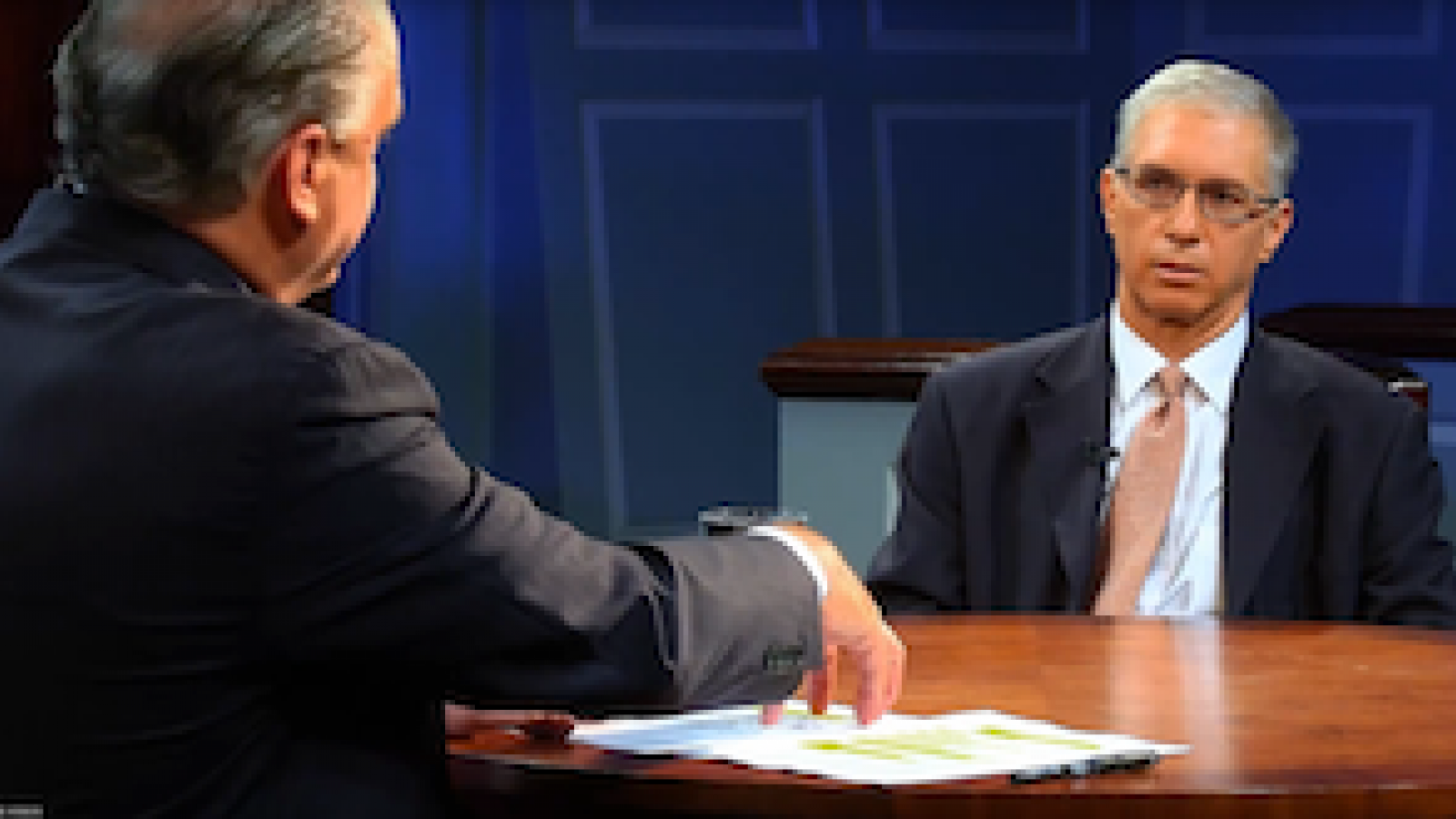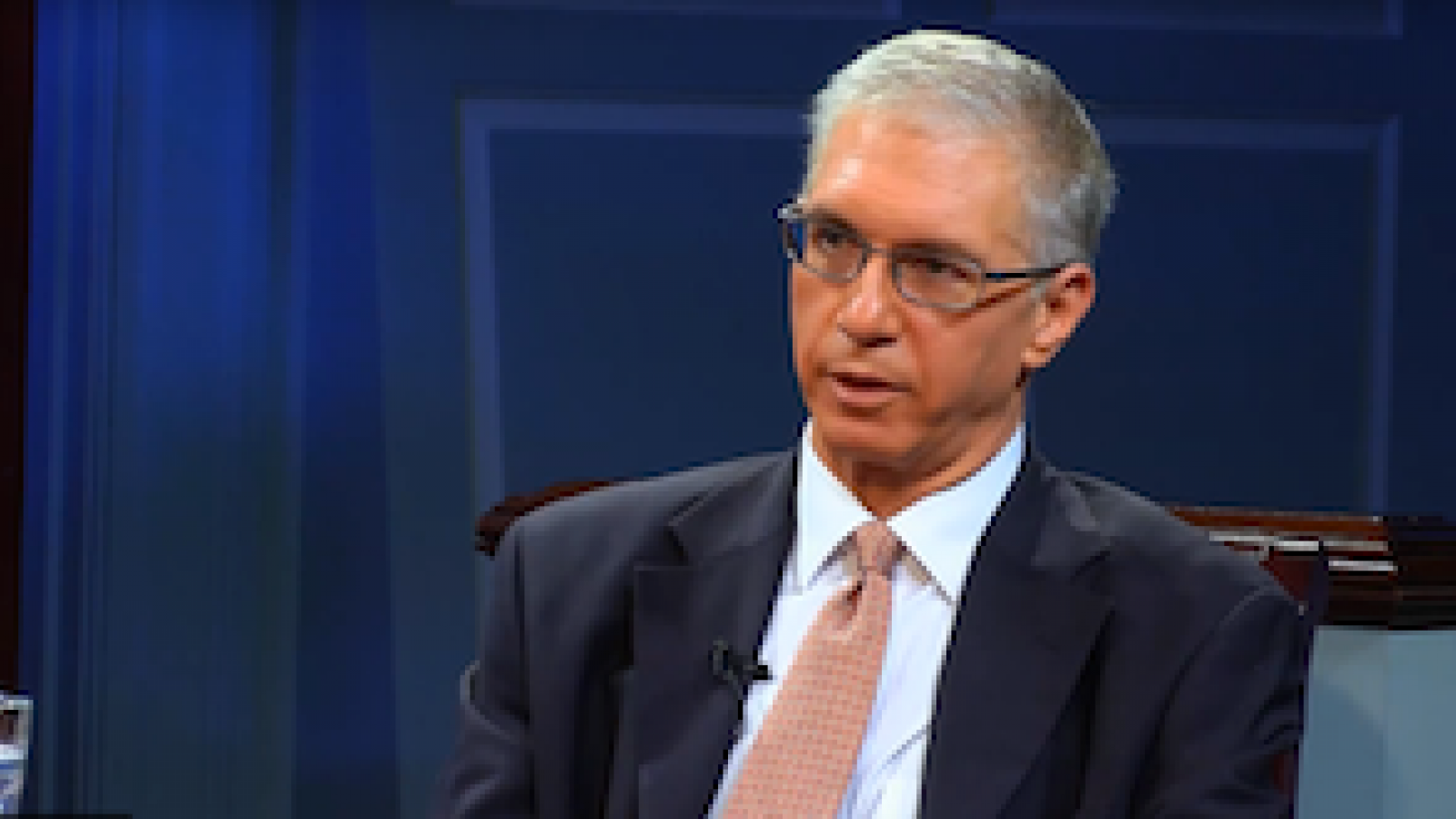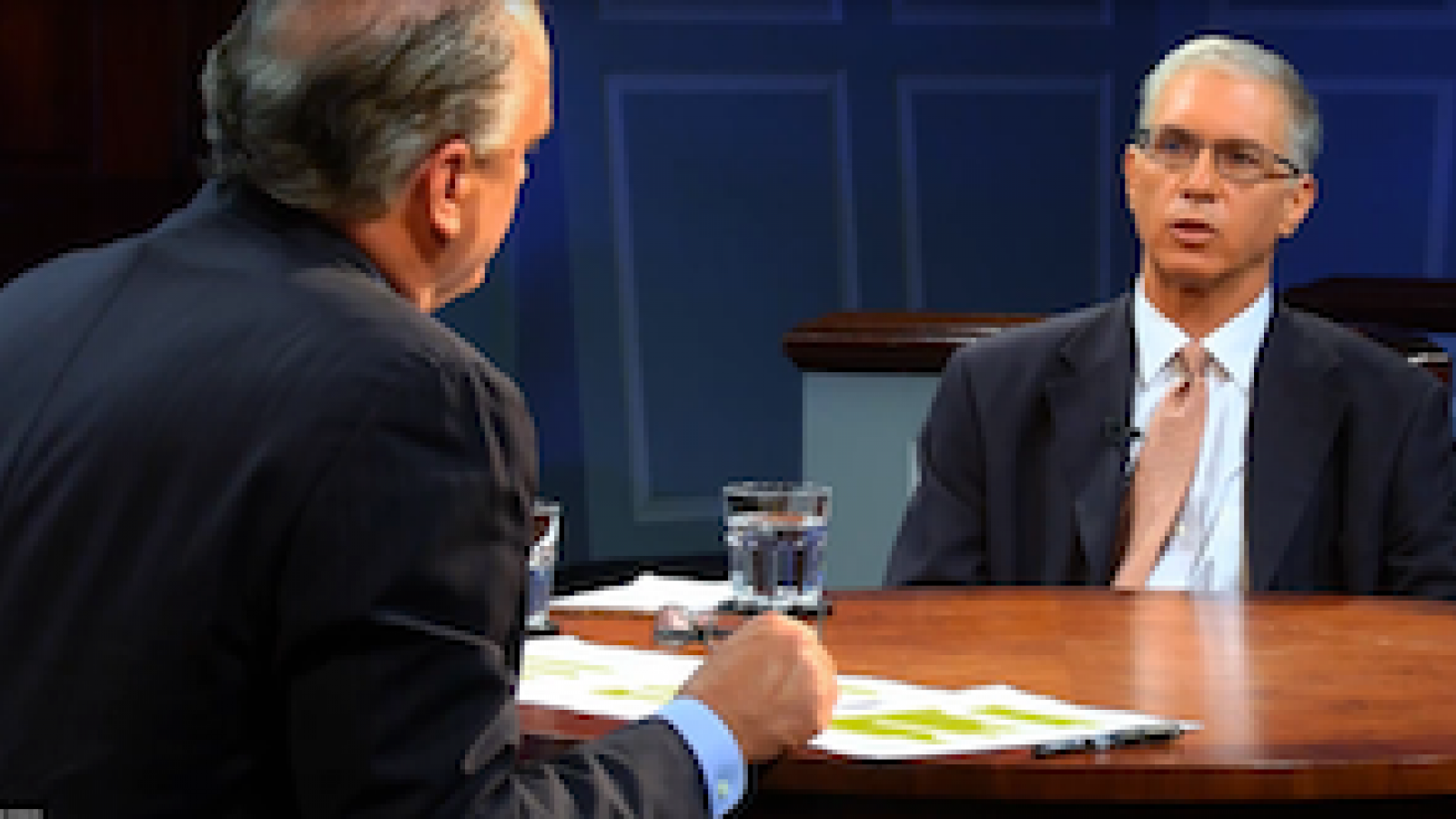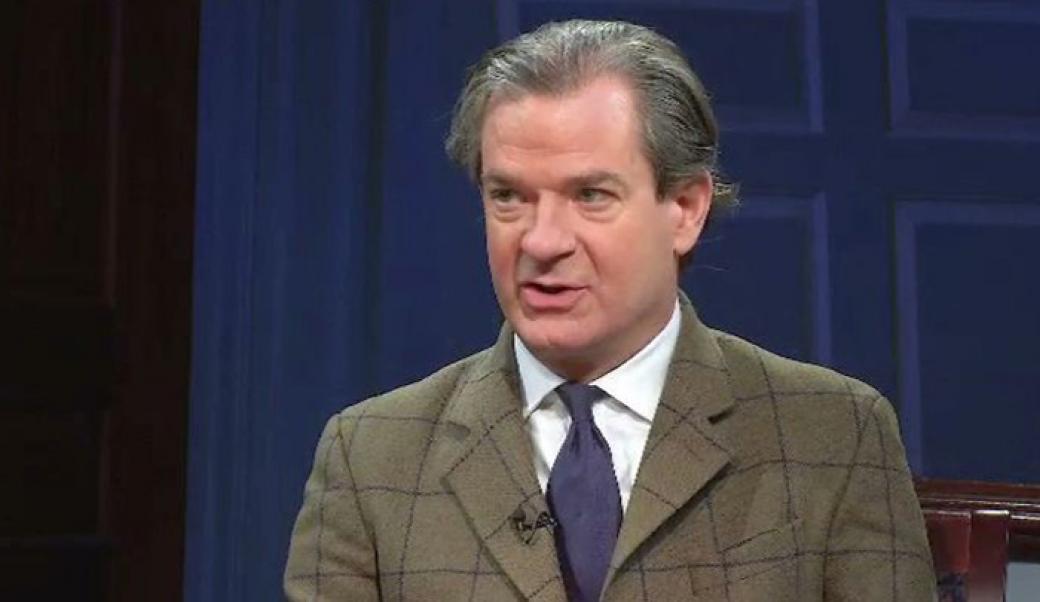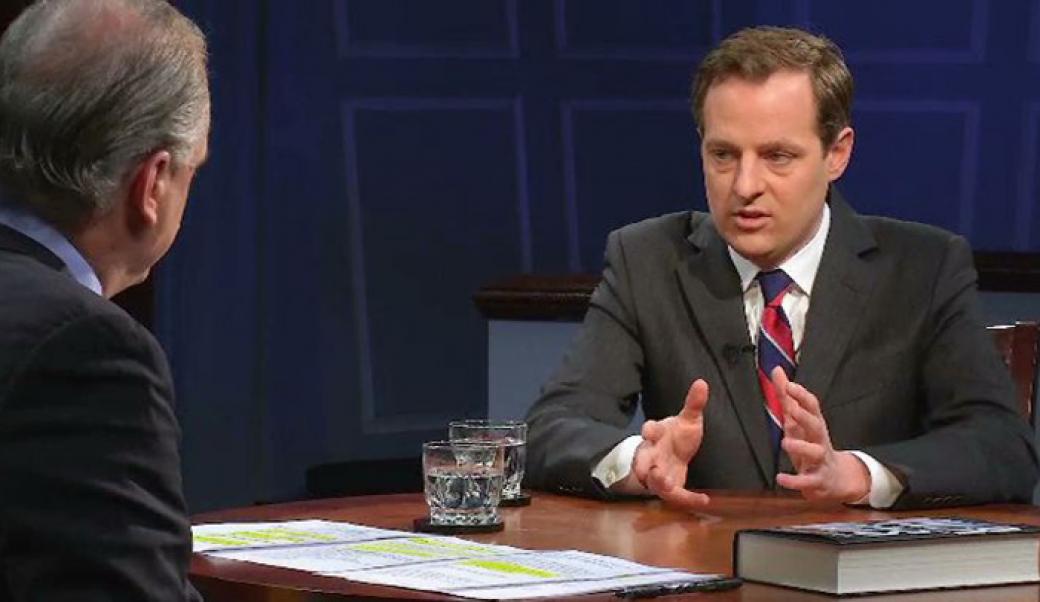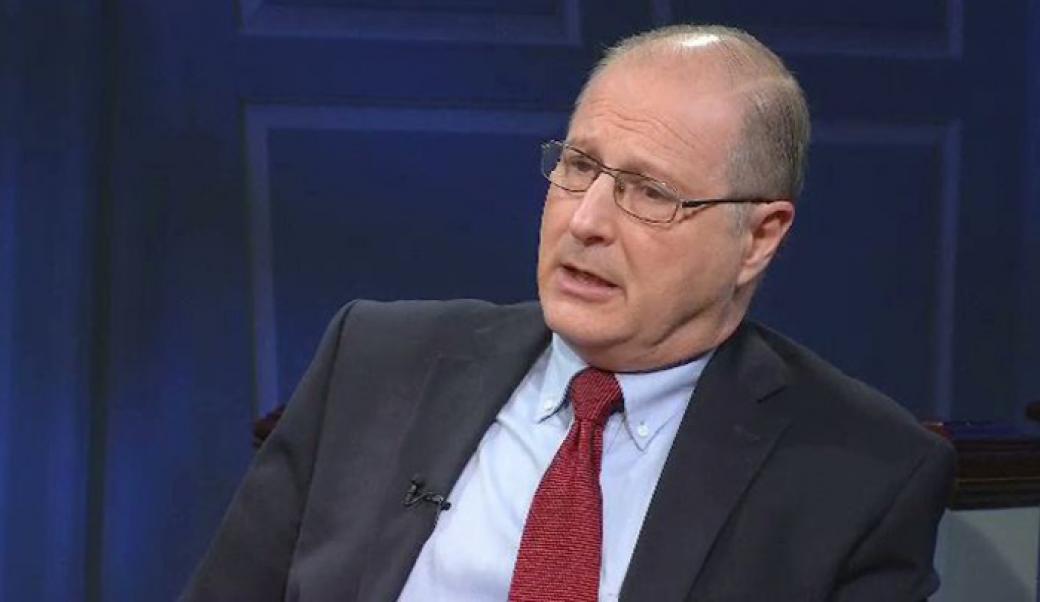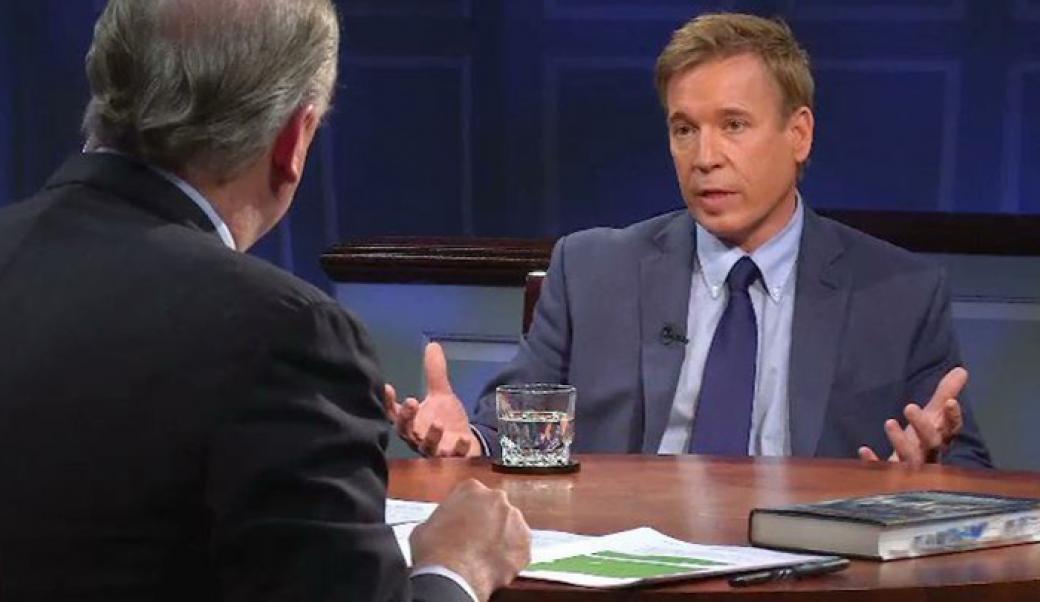About this episode
September 10, 2017
Marc Selverstone
This week, American Forum offers a preview of Ken Burns' epic new PBS series, The Vietnam War, which reexamines the conflict as well as its lingering effects. For a generation, this war shaped US foreign policy and the perception of our country. It affected American views on the military, politics, and the use of force abroad. It was also a heart-wrenching experience for those who were there and those who loved them. We preview the film with one of our own: Marc Selverstone, a Miller Center historian who worked as a consultant on the project.
War and Terrorism
Preview of Ken Burns' new PBS series on the Vietnam War
Transcript
0:41 Douglas Blackmon: Welcome back to a new season of American Forum. I’m Doug Blackmon. It has been more than forty years since the last American servicemen and women came home from the Vietnam War—a conflict which in the 1960s and ’70s profoundly shaped U.S. foreign policy, and, for a generation, the global perception of our country. It also deeply affected American views on the military, domestic politics, and the use of American force around the world. And, it was also a heart-wrenching experience for those who were there, and those who loved them. It was not until the first Persian Gulf war in the early 1990s that the U.S. would again engage in a “hot” military deployment on a truly strategic scale—and even then, the specter of Vietnam and fear of another “nation-building” quagmire haunted U.S. civilian and military leaders. Yet another decade later, in response to faulty intelligence about the 9/11 terrorist attacks and the regime of Saddam Hussein, the U.S. finally unleashed its full military fury for the first time since the Vietnam War. Since then, we have often debated whether the quagmire that followed that invasion occurred because we had—indeed—finally forgotten the lessons of Vietnam.
Beginning this week, PBS stations all across the United States will take Americans back to the story of the Vietnam War, the decisions that shaped it, and its lingering effect on Vietnam, millions of its citizens, American soldiers and their families, and the world today.
The Vietnam series is an epic project. Produced by the legendary documentary film team of Ken Burns and Lynn Novick, it runs a total of eighteen hours, broken into ten nightly installments. It took a decade to make, features scores of Americans and Vietnamese—both those in the South who were allied with the U.S. and communists from the North who ultimately prevailed over U.S. forces. It is an astonishing account of who fought, who died, who supported or opposed, the music and cultural context that shaped those people and their era, images you have never seen, and finally of the millions and millions of lives that were forever transformed. They don’t call it epic for nothing.
In this episode of American Forum, we’re going to take a sneak peek at the Vietnam series and explore what it’s really about, with one of our own: Marc Selverstone, an historian here at the Miller Center, an expert on the Cold War and the Vietnam conflict, and who worked as a consultant to the PBS Vietnam series. He is currently completing a book entitled The Kennedy Withdrawal: Camelot and the American Commitment to Vietnam. Thank you for being here.
Marc Selverstone: Pleasure.
3:19 Blackmon: So, Marc, uh, I was a young college student in 1983 when PBS came out with the last big Vietnam series. Uh, it made a huge impression on me at the time. Uh, it was a window into the world of so many men who, uh, had been significant figures in my childhood, and the PBS driver who I worked for every holiday as an assistant loading packages, uh, the Vietnamese family that my church adopted when they were refugees in the ‘70s. It was a transformative moment for me, a real PBS kind of moment, but so, now, we’ve had these decades pass since that time. Uh, what’s different about our understanding of Vietnam now versus the early 1980s and how does this series capture that?
Selverstone: I would just say that it was a transformative moment for me as well. I was also a college student in 1983. And I remember watching all of those episodes wondering why the world was the way it was, uh, and in many ways I think that, uh, launched me in the direction that I—I eventually went. I was very interested in thinking about that 1983, uh, series and how it compares with this one. And I think one of the things that’s really significant is that now we have access to so many more voices that we didn’t have access to then. It’s changed our understanding of the regional dynamics, the international dynamics, as well as, uh, what was going on in Washington, particularly in the White House, because one of the pieces of evidence that we didn’t have at that—at that time were the White House tapes, and they play a significant role in this film.
FACTOID: Over three million killed in Vietnam War
4:51 Blackmon: In terms of the White House tapes, these recordings that were being made se—unbeknownst to most of the people in the room at the time, these Oval Office recordings from the Kennedy administration and the Johnson administration, even more significantly, and then Nixon—
Selverstone: Right.
Blackmon: Uh, famously, in so many ways, but how was it that the opening up of that material changed our understanding of Vietnam?
Selverstone: I think for so many—and this will come through in the film—there’s a real disparity between the public optimism of so many officials, and particularly the presidents, and their private pessimism. And I think that’s particularly the case with LBJ and Richard Nixon. Uh, it’s there with Kennedy, um, although I would say that there’s a little bit more consistency between the doubts that he expresses internally and those he expresses publicly, particularly in a—in a noteworthy interview with Walter Cronkite in early September, 1963. But it’s that gap between what the public was being told, and what the policymakers were thinking and wondering about the war, wondering about, uh, the strategy that they had hit upon, wondering about their capacity to, uh, win this war. I think that’s what’s really arresting.
FACTOID: At time of Kennedy assassination, 20K U.S. soldiers were in Vietnam
6:05 Blackmon: And one of the—one of the audio recordings from the White House that’s in the film, that’s featured, is of Kennedy immediately after, uh, there’s been a coup, essentially, and the South Vietnamese premier has been—prime minister has been assassinated, and it was an undertaking that the U.S. had tacitly supported or been a part of, uh, though Kennedy had not or, at least, asserted that he had not realized that it would go as far as the actual execution of the South Vietnamese leader. And he walks into the Oval Office, and he sits down with his recorder, and he dictates essentially a memo to history that perhaps is, um, an effort to clean up his—exactly what his involvement was, arguably. But then, there’s this very poignant thing—and I’m not sure if this is in the film, but on the tape, then, as he’s doing that, John John, little John John, walks into the Oval Office, and the president says, “Hey, have you played—have you seen these tape recorder things?” And they have this sweet little moment, and then he goes back to talking about South Vietnam, and then, I think it’s three weeks later, he’s dead.
Selverstone: Yeah.
Blackmon: Uh, the president is assassinated. But what—that’s sort of an example. What—did it capture what you were just describing in terms of this disconnect between the president pri—presidents privately and the message they had for the people publicly?
Selverstone: I think it does. And, again, with Kennedy it’s a little bit different. I think in that particular clip, um, he actually fesses up in a way to the culpability of the United States in this coup and talks about all the problems that they had, uh, in August of—late August of 1963 when a particular telegram was sent out to Saigon, and it shouldn’t have been sent out the way it was, and more people should have had a chance to, uh, consider its contents. Uh, but the conversations that are—I think, are really startling and that we’ve listened to here for years and years and some scholars know about, but I don’t think the broader public really, uh, has had a chance to appreciate uh, what’s in those materials. When you hear Lyndon Johnson wondering in early 1964 whether the United States is really going to be able to prevail, uh, when he’s speaking with not only Robert McNamara but Richard Russell, who is in many ways, uh, one of his mentors in the Senate, “What is—what is Vietnam worth to me? What’s it worth to this country?” And Russell is telling him it’s not worth a damn bit, and you can hear Johnson just churning, thinking about, “Should I go through with this? Should I go through with this?” And then, of course, we know that he goes through with it for a host of reasons. But to hear the President’s private doubts there and then to hear Richard Nixon say, “South Vietnam is finished. There’s no way that they’re going to be able to hang on,” and then to publicly say, “Vietnamization has succeeded. We’ve given the South Vietnamese all the tools that they need to hold off the North Vietnamese,” again, it’s—it’s quite startling.
FACTOID: President Johnson’s approval dropped from 70% to 40% from 1965-1967
8:51 Blackmon: And we also have, uh, the—in this film, there also is featured something that most Americans, even though there have been some books now written about it in recent times and there’s a scholar here at the Miller Center, Ken Hughes, who—one of the main voices about this, but what’s known as the Chennault Affair, uh, but which is treated very seriously, uh, in this film or in this series. And what that is is the allegation now, though now with a tremendous amount of evidence around it, that candidate Nixon in 1968, uh, tampered with the peace negotiations, uh, related to Vietnam and arguably may have uh, extended the war in some respects, essentially by saying, “Don’t cut a deal, uh, until I’m elected president, and then I’ll give a better deal after that.” And arguably, the war extended several years because of that with a loss of a significant number of additional American lives. Um, and so that’s something that has been rumored about for many, many years, written more about in recent times, and now being presented as very much so a part of the narrative of Vietnam, right?
Selverstone: Yeah, there—and there are lots of people who don’t know that story. And Ken, who was a consultant along with me on this project, has done so much to popularize that and to make more people aware of it, and I think that this series will do that, um, in even greater detail. And it’s a story that needs to be told. It’s a story that has echoes in the 2016 presidential election, uh, and to see the Burns-Novick film do that dramatically, uh, and to talk about the potential implications, again, uh, it probably got in the way of talks starting. We have no idea what would have happened had they actually begun at that point, but it’s certainly the case that Hubert Humphrey stood a better chance of winning the election given how close it actually was, just mere percentage points and a fairly close vote margin. So it’s not clear what the actual impact on the war would have been, but on American politics, domestic politics, I think you can make a stronger case that that’s really where it would have had an impact.
11:00 Blackmon: But also we’ve had—there’s been kind of a revolution in the last decade, uh, in terms of information that’s available from—out of Moscow at a period in time when archives were open there and also an understanding of what was actually happening in Hanoi and, uh, rivalries in the politburo and where Beijing was and all of these things that were incredibly remote from Americans during the conflict and even long after. How has—how has that access changed our understanding, and how does that make its way into the film?
Selverstone: There’s one—there’s a great scene in which in early 1966, I believe it is, Johnson and McNamara are on the phone, and McNamara is telling LBJ about this figure in the, uh, politburo in North Vietnam, Le Duan, and it’s a name that McNamara seems only to have become aware of just at that point, and he has to actually spell it out letter by letter, L-E D-U-A-N, for LBJ.
FACTOID: Politburo was central leadership of Vietnamese Communist Party
And Le Duan was at that point the most, uh, powerful person in the politburo. He essentially had eclipsed Ho Chi Minh by 1963, but that’s not something that the Americans knew about. And all throughout the 1960s they keep, um, focusing on—fixing on that figure, Ho Chi Minh, as the enemy, the adversary, and it wasn’t the case at all. And, in fact, it’s—one of the ways that we know that we are getting at better material now is that the emergence of Le Duan as a player in this history that more and more people will know about, I think, is significant, and it allows us to dive in deeper to see what the tensions and the fissures were within the politburo, and they were significant, within the Vietnamese Army, and they were significant. People such as, uh, Võ Nguyên Giáp, the great victor in Dien Bien Phu, the Battle of Dien Bien Phu, 1954. He’s sidelined. Giáp is not the key military figure throughout the 1960s, but in many ways American officials are still thinking about, uh, those two larger-than-life figures.
12:59 Blackmon: Yeah, the guy who forced the French out and had the war—
Selverstone: Exactly.
Blackmon: And had the war turned over to us. It does underscore that the information that’s getting to a president matters. Whether it’s right matters. Again that’s all about the leaders, uh, the big decision-makers on both sides of the conflict or the multiple sides of the conflict. In the end, that’s really not what the film is about, is it?
Selverstone: Right. No.
13:19 Blackmon: So what is the film about, and what was most powerful about it for you just as a viewer? Not so much as an analyst and a historian, but what’s most powerful about this gigantic eighteen hours?
Selverstone: It’s the testimony of eighty-some-odd people from North Vietnam and South Vietnam, from the United States, from all walks of life, from Marines, people in the Army, from guys who were flying bombing missions over the Ho Chi Minh Trail. Uh, to the people back home in the streets and the challenges that they had in engaging with the war, some in a very profound way. Families being split up, people having to decide whether or not they should go ahead and enlist or whether they should, uh, accept induction or flee to Canada or do something else. These stories are powerful, and I come at this from a position of utmost humility. I was born in the very early 1960s. I am—I study the Vietnam War as a scholar. I don’t have a real, tangible sense of what that was like, but I think, as a result of this film, it will be brought home to more and more Americans what it was like for so many to have to e as—be a part of that Vietnam generation and experience a war that changed lives profoundly, whether they were men who were fighting the war, or the women who went over there to support, or the families back home, or the kids who were in college and the choices that they had to make. It’s just an extraordinarily powerful experience.
FACTOID: About 58,000 Americans were killed over duration of Vietnam War
15:09 Blackmon: One thing that I think the series does get at is that those were human beings on the other side as well, no matter what else was going on.
Selverstone: Yeah, the film does a great job of humanizing all sides, um, whether they’re Viet Cong or North Vietnamese regulars. Uh, it’s very much brought home that these were people who felt in many ways about their loved ones, about the country, the way Americans felt about, um—about their own. And in the early 1980s, thinking back to the 1983 WGBH series in which, um, Vietnamese voices were heard. Still, the popular image that we’re getting of the Vietnamese is very two-dimensional. It’s—they’re cardboard cutouts. When you think about the movies that we were watching at that time, that if the Vietnamese were on the screen at all, um, they were very plastic with hardly any depth at all, and now I think we’re able to see them much more in broader relief and have a better understanding of the challenges that they felt as well. And I would say that that’s also one of the contributions of this film, is that you hear North Vietnamese—now Vietnamese—expressing regret, and sorrow, and a sense of frailty, and some questions about the propriety of the tactics of Hanoi, and that’s not something that you would have heard in 1983 at all.
16:33 Blackmon: Let’s, uh—let’s watch a very short clip from, uh, what was to me one of the most arresting interviews, uh, of the parts of the series that I’ve seen. Uh, it’s with a Viet Cong soldier, now an old man, uh, talking about his perception of American soldiers and, really, a little eerily—to be honest, to me—it’s clear what he’s describing is being out of sight on the edge of—you know, out of sight from American soldiers after some sort of engagement has occurred, and he’s watching the behavior of the Americans as they are rescuing their wounded and interacting with each other, very, very moving. But, uh, let’s—let’s just take a look at that for a minute and then come back and get your reactions to it.
PBS trailer for ‘The Vietnam War’ Documentary: (spoken in Vietnamese with English subtitles)
Le Cong Huan – Viet Cong [Music] “I witnessed Americans dying. Even though I don’t know their language, I saw them crying and holding each other. When one was killed, the others stuck together. They carried away the body, and they wept. I witnessed such scenes and thought, Americans, like us Vietnamese, also have a profound sense of humanity. They cared about each other. It made me think a lot.”
18:12 Blackmon: So how did you react to that interview?
Selverstone: Again, I think it’s part of the process of, uh, what happens when people gear themselves up to go into combat. Uh, the enemy is often demonized and their humanity is reduced or flattened out as part of the process of allowing you to do things that are at the edge of our being.
FACTOID: Last U.S. combat troops left South Vietnam in March 1973
Uh, and, uh, that happens on both sides. And I think there is this window, and there was that window for Americans—there was that window for Vietnamese as well—to see that in slivers. Um, and, again, it’s just this great opportunity, I think, for so many of us to, uh, appreciate the war in these more complex terms with much greater depth.
19:05 Blackmon: But it does seem to come back again and again—and we’ll watch another clip in a minute that touches on this in another way, uh, but the—it does seem uh, that the whole series is a deliberate effort not to focus on, uh, whether a particular strategic decision by the military leadership was the correct one, or whether General Westmoreland was—uh, made the right decisions at particular times. It’s not really that kind of a project. It’s about these stories of human beings, and if there is a message it does seem to be that the people on both sides were human and were both suffering from all of this. I mean, is that your perception?
FACTOID: General Westmoreland led U.S. troops in Vietnam from 1964-1968
Selverstone: Yeah, absolutely. Uh, in some ways I would have wanted—just because that’s how I’m wired—I want to know more about policy. I want to know a little bit more about how they can construct their story to give us a better sense of what was really possible and where were the fault lines with policymakers, but that—that’s not what they’re interested in
20:04 Blackmon: Let’s, uh—let’s watch another short clip, uh, this one with an American soldier named Karl Marlantes, I think a Marine. I don’t have my notes, uh, but with an American Marine named Karl Marlantes. Uh, let’s watch that now.
INSERT PBS trailer for ‘The Vietnam War’ Documentary:
Karl Marlantes – Marines: [gunshots/music] “One of the things that I learned…in the war…is that we’re not the top species on the planet because we’re nice. We are a very aggressive species. It is in us..and..people talk a lot about how well the military turns you know, kids into you know, killing machines and stuff. And I’ll always argue that it’s just finishing school. What we do as civilization, is that we learn to inhibit and rope in these aggressive tendencies. And we have to recognize them. I worry about a whole country that doesn’t recognize them. ‘Cause think of how many times we get ourselves in scrapes as a nation, because we’re always the good guys. Sometimes I think if we thought that we weren’t always the good guys, we might actually get in less wars.”
21:17 Blackmon: How did you react to the interview with Marlantes?
Selverstone: It was powerful. Um, uh, it speaks to, uh, the darker side of human nature, and it is a side that the film brings into high relief. Uh, and one of the threads, again, that you’ll see in this film, uh, is that capacity to do bad as well as the capacity to do good kind of in tension with each other throughout, and there are any number of moments where we hear of, just extraordinarily evil almost on the part of soldiers, Americans as well as Vietnamese, um, things that are very hard to listen to. But you also get a sense that many who went over—again, particularly in the earlier period—and, I think, dramatized in some of the really phenomenal film that they have on pacification early in the war, on efforts to, uh, develop Vietnamese civil society, to bring healthcare and education and to build roads and schools and all of that. You also see that goodness and that optimism that people carried with them, and in many ways that’s that sense of exceptionalism of the United States as the force for good, as a country that almost could do no wrong, that stood outside of history in a way. That gets shattered later on in the war.
22:54 Blackmon: Last question. Uh, in the end, uh, your read on this whole series, does it conclude whether Vietnam was, uh, an immoral war, or one that in some fashion can be justified?
Selverstone: I think the virtue of the series, one of the many virtues of the series, is that it’s giving people a fair amount to work with to try to grapple with those questions themselves. I don’t think that they wanted to be really didactic filmmakers and to pronounce on the war. Um, it is such a complex, uh, event um, that had so many different dimensions to it over such a long period of time. They certainly highlight those moments that were turning points in the war, and you can ask whether or not the appropriate move was made. But I think that what they’re trying to do is to open up that conversation that we can then have and continue to wrestle with.
24:00 Blackmon: And hopefully it may be a conversation that, as we have it, we’ll—it will help us with the ones that, uh, we face now and that young people who know nothing about—who seem to know absolutely nothing about this conflict maybe will learn, uh, will draw some of that wisdom from it.
Selverstone: And that’s what I’m hoping comes from this. I know that in many ways the people who are on screen, the voices, the testimony that we hear from people, are people of an older generation. Uh, people who had fought in the war by and large, some policymakers who had been in the war, although not many. Um, John Negroponte and Les Gelb, uh, Robert Gard are there, but for the most part it’s a ground-eye view of the war by the people who fought it on both sides. And while it’s an opportunity, I think, for so many in that generation to, uh, to hear each other’s stories, for the country to hear their stories, to get a better sense of who they were and the challenges that they faced, I really do hope that it’s—these are stories and this is an episode that a younger generation can hear about. My sense from teaching is that it’s just not a period of history that the younger generation has access to, and I’m hoping that this film gives them an opportunity to dip in a little bit.
FACTOID: Approximately 2.7 million Americans served in Vietnam
Blackmon: Marc Selverstone, thanks for being here.
Selverstone: It’s a pleasure. Thank you.
Blackmon: For details and airtimes about the Vietnam series on PBS, visit PBS.org. And for future episodes of American Forum, come back here on your PBS station or watch live tapings at the Miller Center Facebook page. You can reach me on Twitter, @DouglasBlackmon, and you can find Marc Selverstone at millercenter.org. See you next week. (applause)
